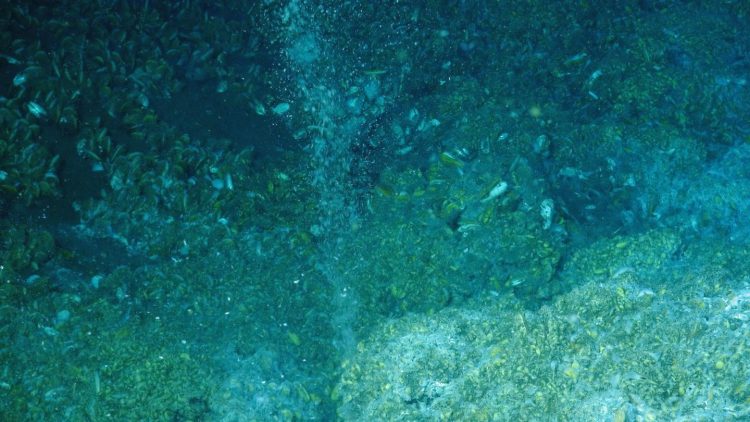Ocean currents disturb methane-eating bacteria

Cold seeps, the sites on the ocean floor where the bubbles of the methane gas rise up, are a home for a varied communities of bacteria, bivalves and other associated life forms. Photo: NOAA-OER/BOEM/USGS
There is a large, and relatively poorly understood, community of methane-consuming bacteria in this environment. They gorge on the gas, control its concentration in the ocean, and stop it from reaching the ocean surface and released into the atmosphere.
In the atmosphere methane is a much more potent climate gas than CO2 and it can amplify current global warming.
However, a new study published in Nature Geoscience shows that ocean currents can have a strong impact on this bacterial methane filter.
Varies drastically
Oceanographer Benedicte Férré, who is a team leader at CAGE, is a co-author of the study. It shows that the level of activity of the methane-consuming bacteria varied drastically over very short time spans.
The international team of scientists behind this study was able to detect that the fluctuations in bacterial communities changed at the whim of the West Spitsbergen Current that carries warm water from Norwegian Sea to Arctic Ocean. Important oceanographic factors such as water temperature and salinity changed.
The warm and salty current swept over the methane seeping sites, and carried bacteria communities away, thus disturbing methane filtration processes.
Important for the future release
This bacteria filter could become even more important in the future, because environmental change can cause bottom water warming in the Arctic Ocean.
As a consequence methane rich gas hydrates in the ocean floor dissociate, and release even more gas to the water column. This could increase food supply for bacteria. But whether bacteria are able to consume the methane depends on ocean current dynamics as documented by Ferre and her team.
Future methane release from the ocean to the atmosphere will depend on ocean currents.
“We were able to show that strength and variability of ocean currents control the prevalence of methanotrophic bacteria”, says Lea Steinle from University of Basel and the lead author of the study, “therefore, large bacteria populations cannot develop in a strong current, which consequently leads to less methane consumption.”
Media Contact
Maja Sojtaric
maja.sojtaric@uit.no
Media Contact
All latest news from the category: Earth Sciences
Earth Sciences (also referred to as Geosciences), which deals with basic issues surrounding our planet, plays a vital role in the area of energy and raw materials supply.
Earth Sciences comprises subjects such as geology, geography, geological informatics, paleontology, mineralogy, petrography, crystallography, geophysics, geodesy, glaciology, cartography, photogrammetry, meteorology and seismology, early-warning systems, earthquake research and polar research.
Newest articles

NASA: Mystery of life’s handedness deepens
The mystery of why life uses molecules with specific orientations has deepened with a NASA-funded discovery that RNA — a key molecule thought to have potentially held the instructions for…

What are the effects of historic lithium mining on water quality?
Study reveals low levels of common contaminants but high levels of other elements in waters associated with an abandoned lithium mine. Lithium ore and mining waste from a historic lithium…

Quantum-inspired design boosts efficiency of heat-to-electricity conversion
Rice engineers take unconventional route to improving thermophotovoltaic systems. Researchers at Rice University have found a new way to improve a key element of thermophotovoltaic (TPV) systems, which convert heat…



